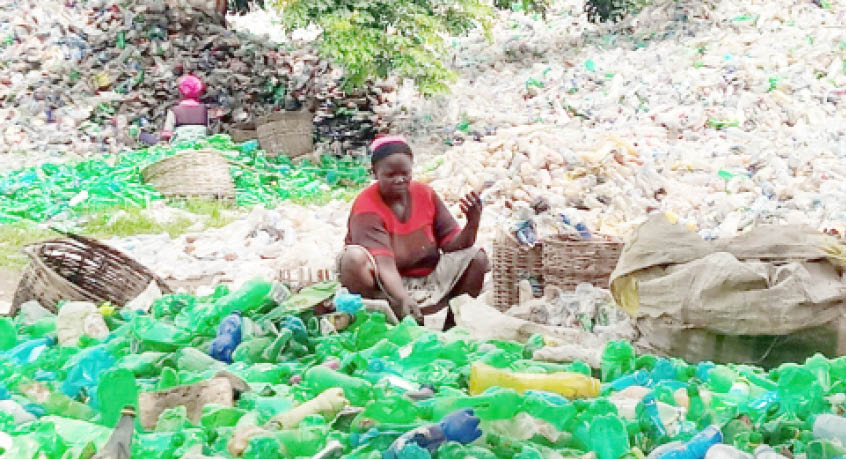Impoverished folks faced with the challenge of lack of means of livelihood in their home states have developed a penchant to relocate to Abuja, the Federal Capital Territory, where they can access mega dumpsites to scavenge for survival. Findings by our reporter who went round the city to interact with them indicated that most of them migrated from the North after abandoning school to carry out what they describe as a cash-for-trash business. They told Daily Trust their stories.
Pushing a long body cart with a gunny sack, 17-year-old Sani Usman walks a lengthy hour every morning to collect refuse from residents in Kubwa, a satellite town of Nigeria’s Federal Capital Territory, Abuja.
As early as 6:00 am, he dashes into the streets and manoeuvres his cart from house to house to empty garbage bins and also collect some recyclable materials.
- THE BEARING: How Nigerian Women Are Holding Themselves Back In The Media
- Two children die as school toilet collapses in Niger State
Though he charges N200 for each trash can he empties, the plastic bottles, metals, glass containers, paper packages and other recyclable materials that he sifts fetch him more money from the business.
As a workaholic, Usman takes non-recyclable trash to a refuse discharge point in Kubwa where tens of trash trucks are brought for uploading and taken to government-approved Gosa dumpsite for disposal.
“With this job, I take good care of myself and my aged mother in the village. The least I earn everyday is N3,000; sometimes, N4,000 to 5,000,” he said.
He added that he earns about N90,000 per month.

But scores of residents expressed dissatisfaction with Usman’s ‘business.’
They told our reporter that scavenging was the dirtiest job to do and portended a bleak future for Usman.
But in his characteristic resoluteness, Usman reiterated the gains of his passion: “Initially, I felt shy doing this job, but I forced myself to continue when it started fetching me some money to solve my problems and take good care of my aged mother. That is why I embraced it with fervor. But I don’t want to spend all my life doing it,” he said.
He, however, lamented that he was always disdained by his customers who also underpays him.
“Some of them underpay me, while some ignore my greetings. But I do force myself to smile at them,” Usman said.
“They also treat me with suspicion, forgetting that I’m rendering them a service they would never allow their children to do,” he added.
While also explaining the hassles of the ‘business,’ Usman said: “After trekking for a very long distance to upload garbage at Kubwa refuse discharge point, the people in charge also charge me and my friends N100 per trip.”
Usman is not the only one in the business. Several young lads of his age are all over the FCT doing it to survive.
Findings by Daily Trust Saturday indicated that in Kubwa alone, hundreds of young men are into the business. Majority of them told our reporter that they did not attend any formal school. A few of them who saw the four walls of school are primary school dropouts.
“If you know the kind of hardship we faced in the village, you would have been the one to encourage us to leave school and come to Abuja to fend for ourselves and our families. There was no food to eat, no teachers in schools and our parents have no jobs. We just had to leave the village in order to survive,” one of them said.
But some of the scavengers are usually accused of trespass, stealing and causing violence in places where they offer services.
“I’ll never forget how a scavenger killed our neighbour four years ago. One of the ‘bola’ boys trespassed on his compound and stole his carpet. In the cause of apprehending him, the scavenger removed a knife and stabbed him in the neck and he bled to death. Since then, we don’t allow any of them to come near our compound. We prefer to bring garbage out to them or load it on a truck for disposal,” Alhaji Jibrin, a resident of 313 Kubwa said.
Daily Trust Saturday also discovered that apart from Gosa dumpsite, there are seven smaller refuse dumps where scores of scavengers operate. They include the ones in Mabushi, Tipper Garage, Kado-Kuchi, Wuse-Gwarimpa Road, Jabi, Pape and Abuja Metro.
An afternoon with Gosa garbage hunters
After collecting garbage from Kubwa and other parts of the FCT, the final destination for the waste and salvageable materials is the Gosa Dumpsite.
At the site, you are greeted by giant pyramids of garbage, sitting on 95 hectares of land that brings together hundreds of scavengers who survive on the cash-for-trash business.
At first sight, you would wonder what on earth the young lads are scavenging from the garbage heaps. But as you gradually ascend the tip, you would notice how they struggle to ‘dig’ out metals and plastics for sale.
At the foot of the huge garbage pyramids were buyers of salvageable items and food vendors who patiently waited for the garbage hunters to descend.
The buyers formed themselves into different groups. While some of them deal in metals and aluminum, others buy rubbers and glasses from the scavengers to sell to recycling companies.
For a first timer, Gosa Dumpsite is another world of its own, a business world that amazes not only this reporter but also those who make their ends meet in it.
For Usman, the hunt for recyclable materials at Gosa Dumpsite is tedious and very competitive. In any case, it is considered as more lucrative than the house to house hustling in Kubwa.
“Here, the garbage comes from the highbrow areas where scavengers don’t have access. So, you would always find some valuables in their trash. But a large number of scavengers scramble for the garbage,” he said.
Usman and his friends told Daily Trust Saturday how they connect with garbage truck drivers.
“The drivers do call us each time they collect trash from highbrow areas like Wuse 2, Maitama, Asokoro and other estates where scavengers can’t access. In return, we appreciate them with tips. That is why they always provide us with privileged information ahead of their arrival, they said.
“At times, what you get from truck could fetch you more profit than what you spent days to collect from house to house in Kubwa,” one of them added.
How cash-for-trash vendors determine scavengers’ worth
Despite the hassles of the business, the values of the scavenged items are determined by the buyers. They weigh the items and fix the cost per kilogram.
“Whether it’s metal, plastics or aluminium, the price is uniform in Gosa. Buyers buy them at N20 per kilogram or even less in Kubwa and other places,” he said.
A mini factory was cited by businessmen in the area where plastic bottles are compacted into huge cubes of plastic and gotten ready for ferrying to companies that recycle them.
Diana Amos, a mother of two, who sits at the base of the huge trash, was seen sorting rubber battles from the caps. Many women do the job there.
“We are paid a wage of N4,000 if we work from 7am to 6pm per week,” she said.
She complained that she spent N200 daily to transport herself to the workplace, which amounts to N1,400 per week.
Some of the scavengers also complained that they work hard but earn less.
“The highest I earn per day is N500 because each kilogram costs only N20, and we are now too many in the business,” one of them said.
The secretary of the Cash-for-Trash Association in Gosa, Malam Muhammad Dan-Kano, said that not only scavengers but also thousands of people feed within the value chain of the garbage business.
“These boys you see are mostly from the far northern states of Kano, Katsina, Kaduna, Zamfara and other places. They left their families at home to find a job here,” he said.
“Just like me, if you see me in Kano you wouldn’t believe that this is the job I’m doing in Abuja. I have built a house and have two personal cars that I drive,” he said excitedly.
He, however, expressed worries that some people label them as criminals.
“We are not criminals and we don’t condone criminality. We profile everybody here before he joined us here,” Dan-Kano said.
He also said they work closely with security agencies, health workers and environment staff to ensure a hitch and disease-free business.
“We live with all kinds of offensive odour, reptiles like snakes and rats that can cause harm,” he said.
One of the scavengers, Mansur, said one of his friends had recently died from high fever, cough and body rashes.
A lot of us encounter health complications but we don’t have options. It’s what we do for a living,” he said.
He appealed to the FCT administration to supply them electricity and establish a healthcare centre in the area for them to have access to quality health care.
A microbiologist, Aisha Abubakar, said that dumpsites harbour both visible and invisible germs which can result in an outbreak of diseases.
“Keeping the places disinfected can help prevent germs-related diseases and the risk of transmitting them by scavengers,” she said.
“Also, they (scavengers) are vulnerable to tetanus through open wounds and other life-threatening diseases caused by infections,” Abubakar added.
The Head of Waste Disposal Facilities and Resources Recovery of the Abuja Environmental Protection Board, Hassan Daji, said that Gosa Dumpsite had a total of 500 hectares of land, but only 90 hectares were currently in use.
He said the site received between 80 to 100 trucks coming in every day, which is equivalent to 1,000 tonnes of waste.
“Waste is dumped without any control or the application of cover soil and the resultant of this is burning the waste,” he said.
He also noted that garbage is constantly being burnt and impacting negatively on the health of the people and adding to the air pollution in Abuja.
Daji, however, explained that the board had been trying to proffer solutions through a waste recycling programme, particularly the waste sorting and source recycling programme being piloted at Life Camp area, Abuja.

 Join Daily Trust WhatsApp Community For Quick Access To News and Happenings Around You.
Join Daily Trust WhatsApp Community For Quick Access To News and Happenings Around You.


